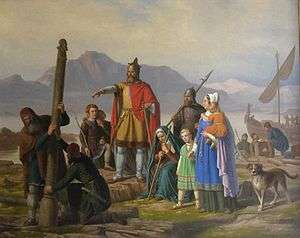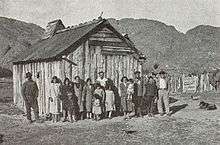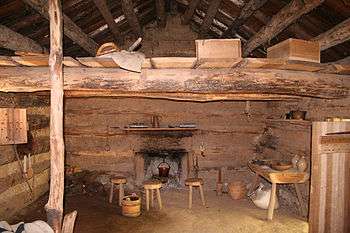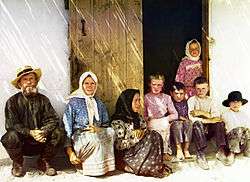Settler

A settler is a person who has migrated to an area and established a permanent residence there, often to colonize the area. Settlers are generally from a sedentary culture, as opposed to nomads who share and rotate their settlements with little or no concept of individual land ownership. Settlements are often built on land already claimed or owned by another group. Many times settlers are backed by governments or large countries.
Historical usage

One can witness how settlers very often occupied land previously home to long-established peoples, designated as indigenous (also called "natives", "Aborigines" or, in the Americas, "Indians"). In some cases (such as Australia), as colonialist mentalities and laws change, the legal ownership of some lands is contested by indigenous people, who either claim or seek restoration of traditional usage, land rights, native title and related forms of legal ownership or partial control.
The word "settler" was not originally usually used in relation to unfree labour immigrants, such as slaves (e.g. in the United States), indentured labourers (such as in Colonial America),[1] or convicts (such as in British America, c. 1615–1775; Australia 1788-1868).
In the figurative usage, a "person who goes first or does something first" also applies to the American English use of "pioneer" to refer to a settler—a person who has migrated to a less occupied area and established permanent residence there, often to colonize the area; as first recorded in English in 1605.[2] In United States history it refers to those people who helped to settle new lands.
In this usage, pioneers are usually among the first to an area, whereas settlers can arrive after first settlement and join others in the process of human settlement. This correlates with the work of military pioneers who were tasked with construction of camps before the main body of troops would arrive at the designated campsite.
In Imperial Russia, the government invited Russians or foreign nationals to settle in sparsely populated lands.[3] These settlers were called "colonists". See, e.g., articles Slavo-Serbia, Volga German, Volhynia, Russians in Kazakhstan.
Although they are often thought of as traveling by sea—the dominant form of travel in the early modern era—significant waves of settlement could also use long overland routes, such as the Great Trek by the Boer-Afrikaners in South Africa, or the Oregon Trail in the United States.
Anthropological usage
Anthropologists record tribal displacement of native settlers who drive another tribe from the lands it held, such as the settlement of lands in the area now called Carmel-by-the-Sea, California where Ohlone peoples settled in areas previously inhabited by the Esselen tribe (Bainbridge, 1977).[4]
Modern usage

In the Middle East, there are a number of references to various squatter and specific policies referred as "settler". Among those:
- Iraq – the Arabization program of the Ba'ath Party in the late 1970s in North Iraq, which aimed at settling Arab populations instead of Kurds following the Second Iraqi-Kurdish War.
- Israel – Israelis who moved to areas captured during the Six-Day War in 1967 are termed Israeli settlers. In recent Israeli settlers have been settling in Palestinian territory such as the Gaza Strip and West Bank. However, this has caused political unrest and many settlers are forcibly removed from their settlements by the Israeli government (Political status of the Palestinian territories).
- Syria – In recent times, Arab settlers have also moved in large numbers to ethnic minority areas, such as northeast Syria.
Implications of Settlement
- Women and children experience violence in these highly dangerous ares because of the conflict. Many natives face displacement when new settlements are established. During 1948 Palestine war, in which, Israel was created, over 750,000 Palestinians were displaced from their homes and not allowed to return.[5] Oftentimes fences are walls are built preventing the natives from traveling back onto the land.
Livelihood
- Settlements make it very difficult for native people to continue their work. For example, if the settlers take part of the land which the olive trees grow on then the natives no longer have access to those olive trees and their livelihood is compromised.[5] Many are met with violence when they try to get the things they need from the land.
Other usages
- Settlers in hypothetical societies, such as on other planets, often feature in science fiction or fantasy fiction and/or video games.
- Mascot for Texas Woman's University, more specifically there called the "Pioneer."
Causes of emigration
The reasons for the emigration of settlers vary, but often they include the following factors and incentives: the desire to start a new and better life in a foreign land, personal financial hardship, social, cultural, ethnic, or religious persecution (e.g. the Pilgrims and Mormons), political oppression, and government incentive policies aimed at encouraging foreign settlement.
The colony concerned is sometimes controlled by the government of a settler's home country, and emigration is sometimes approved by an imperial government.
See also
- Chinese settlements in Tibet
- Green March
- Immigration
- Indigenous people
- Israeli Settlers
- Lebensraum
- Naturalized TRNC citizens
- Phoenix Islands Settlement Scheme
- Patriot (American Revolution)
- Population transfer
- Settler colonialism
- Sooners
- Squatter
- Sri Lankan state sponsored colonisation schemes
- Transmigration program
- Virgin Lands Campaign
References
- ↑ Indentured Servitude in Colonial America
- ↑ Online Etymological Dictionary
- ↑ Robert Greenall, Russians left behind in Central Asia, BBC News, 23 November 2005.
- ↑ Prehistoric Sources Technical Study, prepared for the city of Monterey by Bainbridge Behrens Moore Inc., May 23, 1977
- 1 2 Olson, Pamela (2013). Fast Times in Palestine. Berkeley, California: Seal Press. p. 35. ISBN 978-1-580-05483-6.
